From roses to thorns, the reputation of ABC’s reality TV show, “The Bachelor,” was scratched this season after featuring Matt James as the first Black bachelor, causing students of color to raise questions about racial equity and representation in the media.
Senior Caitlyn Kumi has watched "The Bachelor," a show that began in 2002, on and off this season — but her opinion about the implications of choosing James as this season’s Bachelor has remained constant.
“I think there's always going to be an advancement of culture just with having representation and recognition, because Black love is not always necessarily portrayed,” Kumi said. “It is pretty remarkable regardless because 50, 60 years ago it wouldn't be possible to have an interracial dating show, and I think that the representation of women of different backgrounds is also good, because historically what we usually see love stories or love shows from is the white male or white female gaze.”
While Kumi emphasized the importance of this representation, she believes that the rise of the Black Lives Matter movement was the major catalyst for James' casting, rather than the show taking accountability on their own.
“I think it’s just that with everything that happened over the summer, and then how consumers of television shows are just kind of demanding more diversity of the networks, I think that’s more of the changing climate in America, rather than the show recognizing that they need to do anything,” Kumi said.
First-year Yonas Kemal emphasized that James was chosen more out of societal pressure than a positive internal agenda.
“I think it's good, obviously, that they have a Black bachelor, though I think that it is reactive rather than proactive, 100 percent,” Kemal said. “I think a year's worth of protests and social uprisings probably led to their decision of having one.”
Aside from increased racial awareness, Kemal said he thinks that part of the reason that "The Bachelor" hasn’t featured a Black man as the bachelor before is because the show's target audience is white women.
“In terms of creating racial equity on the show, I don’t even think that’s necessarily possible because of the target market for that show,” Kemal said. “... So what market are you really trying to hit? Middle-aged White women. And who would they rather see on the show? People who resemble themselves.”



